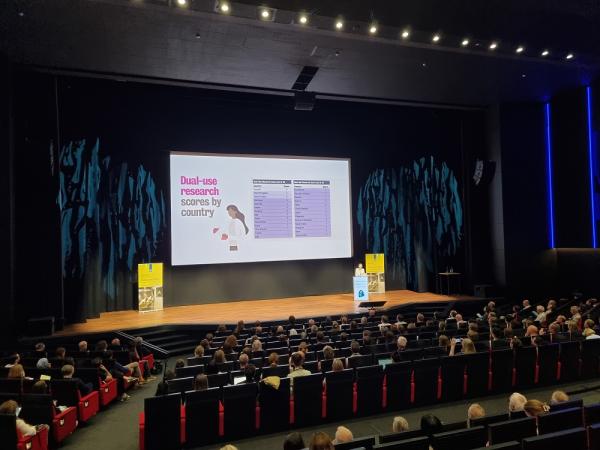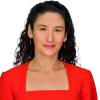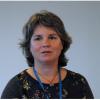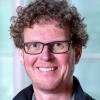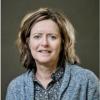On Wednesday 14 May 2025, the Biosecurity Office organised an international symposium at the MECC in Maastricht.
Leading international speakers talked about biosecurity and dual-use. The symposium took place prior to the annual conference of the European Biosafety Association (EBSA) at the same location. During the first International Biosecurity Symposium, international experts took you into the world of biosecurity and dual-use. Topics such as artificial intelligence, emerging technologies and education were discussed. In addition, attention has been paid to biosecurity in practice. The unique connection with the EBSA congress and sufficient space for networking allowed for connections with European stakeholders, thereby strengthening the (inter)national biosafety network.
Program
| 14.00 hrs | Opening and welcome by the Netherlands Biosecurity Office | |
| 14.10 hrs | Biosecurity, AI and emerging technologies | |
| Jaime Yassif, Vice President, NTI Global Biological Policy and Programs, NTI | bio, USA | ||
| 14.35 hrs | Dual-use of emerging technologies & WHO dual use guidance | |
| Filippa Lentzos, Kings College London, UK | ||
| 15.10 hrs | Putting the WHO Global Guidance Framework into action: | |
| Case studies across the world | ||
| Maria J. Espona, Health Security Partners, Argentina | ||
| 15.30 hrs | Coffee break & networking | |
| 16.00 hrs | Biosecurity and dual-use in practice in Denmark | |
| Cyril Martel, Centre for Biosecurity and Biopreparedness (CBB), Denmark | ||
| 16.25 hrs | Biosecurity and dual-use in practice in the Netherlands | |
| Marcel van Bergen, UMC (Universitair Medisch Centrum) Radboud, the Netherlands | ||
| 16.50 hrs | Bridging policy and action: Gain-of-function research at | |
| the Australian Centre for Disease Preparedness | ||
| J.T. Paulley, CSIRO Australian Centre for Disease Preparedness, Australia | ||
| 17.10 hrs | Short break | |
| 17.30 hrs | Bridging policy and practice: Implementing the WHO Laboratory Biosecurity Guidance | |
| Kathrin Summermatter, University of Berne, Switzerland | ||
| 17.55 hrs | Culture of biosafety and biosecurity: What gets measured gets done | |
| Dana Perkins, USA | ||
| 18.20 hrs | Closure by Biosecurity Office and EBSA president | |
| 18.30 hrs | End of meeting and start of EBSA welcome reception |
Speakers
|
Jaime Yassif serves as Vice President of NTI Global Biological Policy and Programs (NTI | bio). In this role she oversees NTI | bio’s work to reduce global catastrophic biological risks, strengthen biosecurity and pandemic preparedness, and drive progress in advancing global health security. |
|
Filippa Lentzos is a Reader (Associate Professor) in Science & International Security at King’s college London. She is cross-appointed to the Department of War Studies and the Department of Global Health & Social Medicine, and she leads several research projects, including on Global BioLabs, disinformation, responsible science and BWC verification. Outside King’s, she is an Associate Senior Researcher at the Stockholm International Peace Research Institute (SIPRI) in Sweden, and a Non-Resident Scholarat the James Martin Center for Nonproliferation Studies (CNS) in the United States. Filippa chairs the WHO Technical Advisory Group on the responsible use of the life sciences and dual-use research (WHO RULS DUR), and she is a member of the WHO Health Security Interface – Technical Advisory Group (WHO HSI-TAG). She is also a rostered expert for the UN Secretary-General’s Mechanism for Investigation of Alleged Use of Chemical or Biological Weapons (UNSGM), and she serves as the NGO Coordinator for the Biological Weapons Convention. (view presentation) |
|
Maria J. Espona, Biologist (1994), Master in Terrorism Studies (2013) and Doctor in Criminology (2019). Currently, she is doing postdoc research at the University of Liege on biological weapons and disease surveillance from the One Health perspective research. She is a professor at universities in Argentina, Georgia and Peru on Information Quality, CBRN export control and dual-use and responsible use of data. She also participates as SME in several Health Security Partners. She works for other NGOs on projects on biorisk management and export control, among other topics, in Latin America and other regions. She is South America's EU (Europese unie) P2P Regional Coordinator and works with SCK-CEN on an export control-related project. In the past, she participated in EU-funded projects on CBRN and export control of dual-use goods and technologies. She is a member of the WHO's Technical Advisory Group on the Responsible Use of the Life Sciences and Dual-Use Research (TAG-RULS DUR). She is the Director ArgIQ, Argentina Information Quality. (view presentation) |
|
Cyril Martel is leading the biosecurity division of the Danish Center for Biosecurity and Biopreparedness (CBB). He has obtained PhD in immunology from the University of Copenhagen in 2010 and has a background within influenza research and surveillance. During the covid-19 pandemic, he has been part of both the national testing and vaccination efforts. He has extensive experience as a bioweapons specialist from CBB, and has participated in numerous exercises, inspections and outreach activities since 2016, both nationally and internationally. (view presentation) |
|
Marcel van Bergen is a BioRisk Professional / Management Advisor at the Radboud Campus (Radboud University and Medical Centre, Nijmegen, The Netherlands) and affiliated companies. In 2010 he started there as a BioSafety Officer, Occupational Health Hygienist (with focus on biological agents) and Environmental Safety Officer. Currently, he is leading the BioRisk Prevention team in Nijmegen. Since 2019 he is chairman of the Dutch Biosafety Association (BVF-Platform). Additionally, he is a member of the EBSA Scientific Working Group since 2018, and chairing this group since 2022. From 1997 till 2010 he was active as Technician, Researcher, Project Leader, Quality Assurance Officer and Bio Safety Officer at the Central Veterinary Institute in Lelystad (Wageningen University, NL). In 2005 he completed his PhD thesis on Molecular Typing of Campylobacter fetus (Utrecht University, NL). Additionally, from 2002 till 2010 he served as a trainer for the World Health Organization. (view presentation) |
|
JT Paulley leads the Biorisk Management Group at the Australian Centre for Disease Preparedness (ACDP) and has over 15 years of experience in high-containment laboratory operations, biosafety, and biosecurity program development. He is an expert for a FAO Reference Centre on Biorisk Management and chairs ACDP’s Gain-of-Function Review Panel. JT earned his Ph.D. from East Carolina University in 2007 and completed postdoctoral research at the University of Kentucky (2007–2010) on the bacterial pathogenesis of Brucella abortus and Yersinia pestis. In 2010, he joined the U.S. Centers for Disease Control, focusing on laboratory biosafety and biosecurity, later becoming Deputy Operations Branch Chief for the U.S. Federal Select Agent Program. In addition to his role at ACDP, JT advises on biorisk management twinning programs in the Asia Pacific region and facilitates applied biosafety training within Australia. He also advises on maximum containment laboratory design and decontamination projects worldwide and is an active member of the biosafety organisations, ABSANZ and ABSA International. (view presentation) |
|
Kathrin Summermatter leads the Biosafety Center at the Institute for Infectious Diseases, University of Bern, Switzerland. She also serves as the managing director of the BSL-3 facility at the Institute for Infectious Diseases and sitem-insel. With over 20 years of experience in biosafety, she headed the biosafety department and served as deputy director at the Institute of Virology and Immunology (IVI)—Switzerland’s reference lab for highly contagious animal diseases (BSL-3 and BSL-3Ag) from 2002 to 2019. She also coordinated BIOSAFETY-Europe and has been an active member of both the European Biosafety Association (EBSA) and the American Biosafety Association (ABSA). In recognition of her contributions, she was named an honorary member of the EBSA. Kathrin is a member of the International Veterinary Biosafety Workgroup and a board member of the Swiss Biosafety Network (SBNet), where she co-chairs its containment working group. She chairs the WHO’s Technical Advisory Biosafety Board (TAG-B) and is a member of its Scientific Advisory Group for the Origins of Novel Pathogens (SAGO). Additionally, she directs the WHO-Collaborating Center for Biosafety and Biosecurity. (view presentation) |
|
Dana Perkins received a PhD in Pharmacology and Experimental Therapeutics from the University of Maryland, Baltimore, U.S., and a M.Sc. degree in Biochemistry/Immunology from the University of Bucharest, Romania. She is an international consultant who worked until recently as a Senior Science Advisor with the Administration for Strategic Preparedness and Response (ASPR), U.S. Department of Health and Human Services. Dr. Perkins is a former member of the Group of Experts supporting the UN Security Council 1540 Committee on Weapons of Mass Destruction Non-Proliferation. She currently serves as a member of the WHO Technical Advisory Group on the Responsible Use of the Life Sciences and Dual-Use Research (TAG- RULS DUR) and of the Board of Directors of the International Federation of Biosafety Associations (IFBA). She is also a Microbiologist with the rank of Colonel in the U.S. Army Reserve; in this capacity, she has held several command positions in medical units and served as the Director of Women, Peace, and Security Studies at the U.S. Army War College. (view presentation) |
